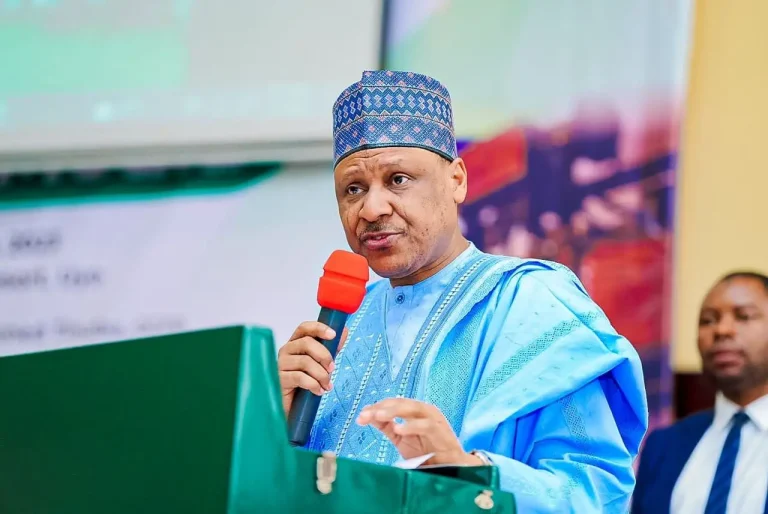From Noah Ebije, Kaduna
As Nigeria charts a new direction for the nation’s economic renaissance for the progress and prosperity of the people through the proposed tax reform, the Minister of Information and National Orientation, Mohammed Idris said the nation’s tax administration system was long overdue for reform on account of general attitudes of taxpayers on taxation, amongst other reasons.
Hon. Idris spoke on Saturday as the chairman of the occasion at the Kaduna State chapter, Nigerian Institute of Public Relations (NIPR), 2024 Annual Public /AGM and Awards.
The Minister spoke on the Theme: Tax Reform: The role of Public Relations in fostering constructive dialogue for national economic renaissance”.
He added that, “the theme for today, “Tax Reform: The Role of Public Relations in fostering Constructive Dialogue for National Economic Renaissance” has brought to the fore yet again, the place of constructive dialogue as a vital pillar of democracy.
He noted that the ongoing review of the country’s tax laws is timely and crucial, especially as part of a larger set of macroeconomic reforms, just as he commended the Presidential Committee on Fiscal and Tax Reform for an excellent job, in terms of public engagement.
Earlier, the President of NIPR, Dr. Ike Neliaku pleaded the institute’s support for the expected reality and implementation of the tax reform in the country by using the vocal voices of the institute across the country.
According to Hon. Idris, “The topic before us today is a sensitive yet important and inescapable one: taxation. It was the American statesman, Benjamin Franklin, who famously said that “In this world, nothing is certain except death and taxes.”
“Let me make it clear that, even with our keenness for fundamental reform of Nigeria’s governance and fiscal systems, the Tinubu administration will never do anything to undermine the ideals of participatory democracy. The current mandate and responsibility that we have for governing and reforming Nigeria at this time came by way of democracy, and we will continue to live up to those very high democratic standards and expectations.
“All over the world, effective taxation is important as a source of financial power for governments to provide social services for their citizens. However, there is plenty of reason to believe and assert that Nigeria’s tax administration system has become long overdue for reform, on account of design and implementation flaws as well as the general attitudes of taxpayers toward taxation.
“In light of this, the ongoing review of the country’s tax laws and realities is timely and crucial, especially as part of a larger set of macroeconomic reforms aimed at setting the country on an irreversible path of growth and development. The full details of the new tax bills are available in the public domain – one must commend the Presidential Committee on Fiscal and Tax Reform for an excellent job in this regard, in terms of public engagement – so I will not attempt to go over these details again here.
“What I will say is that it is very inspiring and heartwarming to see Nigerians from all walks of life coming out to express their views and opinions on these matters of critical national importance, as such is the very essence and meaning of democracy. In spite of the challenge of trust deficit that tends to crop up around matters of governance in Nigeria, we have still been able to have what can be adjudged as robust debate on this sensitive issue.
“President Tinubu has also been very clear that the Executive will listen to and work with all stakeholders to ensure that all concerns are duly and comprehensively addressed. We will continue to ensure open lines of communication and engagement with the National Assembly and all other stakeholders on these taxation bills. We are all in this together, as one people, one nation, and just as we are being called upon to make collective sacrifices, we will also collectively reap the abundant social and economic benefits of all of these necessary reforms.
“It is at times like this that we are reminded of the important roles of Public Relations in the maintenance of a functioning and healthy society. By facilitating purposeful communication, building mutual understanding, and transparent promotion of ideas, Public Relations practice and practitioners can help create a culture of collaboration and progress.
“Also, as President Bola Ahmed Tinubu continues to implement an ambitious fiscal reform agenda that will devolve more resources to Nigeria’s State and Local Governments, and ultimately to the Nigerian people, in the spirit of true federalism, citizen engagement will become ever more critical.
“Those of us who manage communications for the Federal Government understand that we have a lot of work on our hands. We are up to the task, and we will continue to deploy innovative and comprehensive mechanisms to provide the public with insights and enlightened information that will bolster public trust and confidence in the reform narratives of the Renewed Hope agenda.
“We will also be looking to count on the strong support of the NIPR, among many other stakeholders. Which is why this dialogue is very much welcome, and commendable.
“Society advances by mutually respectful engagements, where we give voice to diverse opinions, and respect those who we disagree with. We will certainly not always agree on all issues, perhaps not even on most. But we will always be guided by the fact that the things that unite us – our common humanity, our nationhood, our sense of patriotism, our collective vision for a Nigeria that works for all – will always be more important and more meaningful than our differences of age, religion, region, ideology, gender, culture, and social class”. The Minister said.
